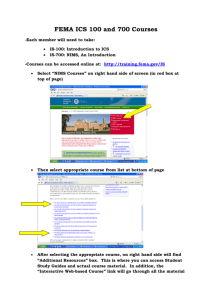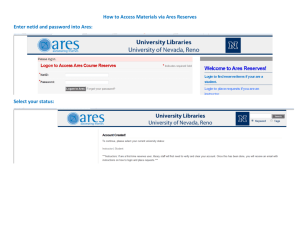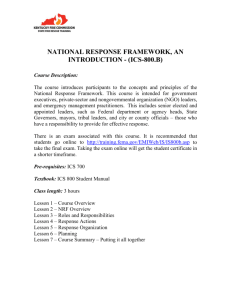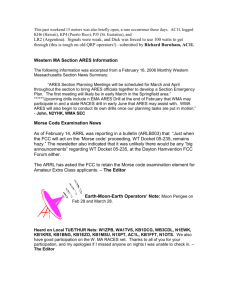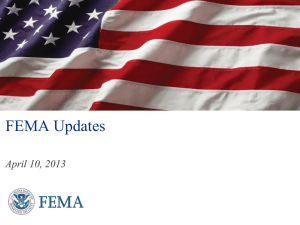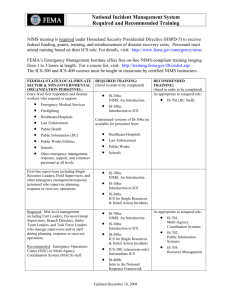ARES Training - Iowa Section ARES
advertisement
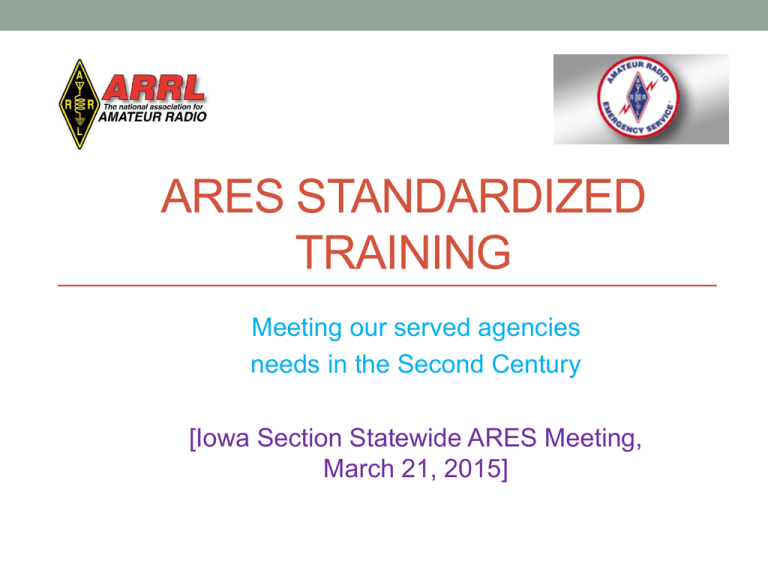
ARES STANDARDIZED TRAINING Meeting our served agencies needs in the Second Century [Iowa Section Statewide ARES Meeting, March 21, 2015] Lee H. Cooper, W5LHC • Section Manager, South Texas Section • WGD Assistant Director for Emergency Communications • Founding member Texas Division of Emergency Management Communications Coordination Group • Member, FEMA Region VI Regional Emergency Communication Coordination Working Group • Contributor, DHS Office of Emergency Communications, AUXFOG pamphlet (companion to NIFOG) [**This presentation used with permission.**] Problem Statement: • No ARES standard training program across field organization • Limited focused, affordable training offerings from HQ • Served Agencies looking for increased validation of standard skill sets in volunteers • Little reliability in using license class as skill indicator • Public Service events provide only limited training • Issue with resource typing and “Away Team” capabilities. League Offerings: • Introduction to Emergency Communication (EC-001) • Cost inhibits participation • Course should be broken into multiple courses with focus on complementing any corresponding FEMA course • No (that I am aware of) validation of course by FEMA or other served agencies as meeting their needs or expectations. • Public Service and Emergency Communications Management for Radio Amateurs (EC-016) • Interestingly, no cost for this more comprehensive course • Very heavy in FEMA related requirements • PR-101: ARRL Public Relations (EC-015) • Free or purchase CD for home study Proposed Solution? • South Texas section, working with all sections in WGD, proposed a standardized training program that can be shared with served agencies to show level of skills • Along with ICS and NIMS, also aligns with COM-L and COM-T training (increases Agency comfort level that we understand the way they operate) [“speak” the language] • Took upcoming AUXCOM classes into consideration • Program was adopted by all WGD Sections (STX, NTX, WTX and OK) and is being implemented West Gulf Division plan: • Implemented a standardized training program across the West Gulf Division. • Allows for a method to classify users (resource type) • Provides ability to present to served agencies a standardized training program modeled off something they know (ComL, ComT, AuxCom) • Improves level of trust between ARES and Served Agencies West Gulf Division plan: Plan has four levels of skill validation: • Basic member (Entry level) • Certified (recommended base level) • Advanced (leadership preparation) • Away Teams (Rapid response /ARESmat) • Modeled after combination of ComT and MARS training. West Gulf Division plan: Plan breaks out into separate knowledge areas Classroom training Participation level Leadership Task Book • Sets standard while allowing options for volunteers to set their own pace to achieve Levels: BASIC • Assumes certain basic operating skills by virtue of being licensed. • Does not necessarily validate competency in those skills. • Entry level into ARES organization CERTIFIED • Sets base level of validated skills desired by organization for ARES volunteer Levels Con’t: ADVANCED • Increased skill set validation. • Candidate for leadership positions • Candidate for Away team consideration AWAY Team • Highest level of training • Able to function on 72-96 hour away team missions in devastated areas. • Prime candidates for Communications Coordinating Group (CCG) requested deployment • IF approved by ARRL Programs and Services Committee, would be a Field Appointment (Black badge) Training Plan: Level Basic Intermediate Advanced Away Team Qualified O O O O O O O O O O R R R R O O O R O O R R R R R R O R O O R R R R R R O R O O R O R O O R R R O R R R R R O R R O O O O O O R R O O R R Notes /Comments Classroom ICS-100 – Intro to ICS ICS-200b – ICS for Single Resource ICS-700a – NIMS Intro ICS-800 – National Response Framework ICS-802 – Communications ARRL EC-001 ARRL EC-016 Skywarn Basic (bi-annual renewal) Skywarn Advanced (bi-annual renewal) Public Information Officer PR-101 NIMS requirement for volunteers NIMS requirement for volunteers NIMS requirement for volunteers NIMS requirement for volunteers Recommended for all ECs and DECs Participation Join an ARES group Directed Net Participation (quarterly) Public Service event (annually) Simulated Emergency Test (annually)* Serve as Net Control Leadership Present Training Session Hold Leadership Position General or Higher License O = Optional R = Required May be in related type organization Training Plan Task Book: Level Basic Intermediate Advanced Away Team Qualified Obtain Amateur License R R R R Obtain General or Higher Class License 0 0 R R Obtain Workbook R R R R Solder PL-259 on coax 0 O O O Build simple dipole antenna O O R R Operate VHF Winlink station O R R R Operate Winlink station peer to peer O O R N/A Operate HF Winlink station O O O R Write and send ICS-213 message O R R R Demonstrate Proficiency in ICS Forms O O R R Program tone into HT O R R R Setup Cross Band repeat on mobile O R R R Program frequency & offset into radio O R R R Build Powerpole adapter cable O O R R Demonstrate ability to setup and operate a Type I Away Team Go Kit* O O O R Assemble 24 hour Go Kit O R R R Assemble 72/128 hour Go Kit O O O R *Complete VHF Packet to HF Pactor linked system O O O R Proficiency/Skill Notes /Comments Summary: Sets standard level of training at Division level (for WGD) Proposed as standard for National level Would provide standards for ARESmat deployments Provides assurances to Served agencies that we understand and are trained in – ICS and NIMS Understanding of COM-L and COM-T roles Experienced with standard ICS forms used in incidents Demonstrates our commitment to working with them in their environment Additional opportunities There are several other areas that can be added to supplement our working relationship with Agencies • Ensure members have (and have read) copy of both NIFOG and AUXFOG • Ask for WebEOC training and become part of their system • Look at how we can use Social media to supplement situational awareness of incidents for them • Seek local training that allows us to become “Force Multipliers” to our served agencies OK…, so how does this apply to us? • The standards proposed in this presentation were • • • • developed for the West Gulf Division and the situations they face. The same criteria may not be totally applicable to our needs in the Iowa Section. Still, the need exists to establish “standards” that are recognized by our key served agencies. At the least, our people should have IS-700, IS-100, IS200, IS-800, and IS-802. Also recommended is IS-775. All of these are on-line courses and don’t require a large amount of time to complete. More: • ARRL courses, especially EC-01 and EC-16, are also recommended. • Again, it should be noted that FEMA/Homeland Security does not currently recognize the ARRL courses as part of their training/certification standards. • Situation is not likely to change any time soon. • Additional training recommendations: • AuxCom Course is highly recommended as part of training. • “Team Leaders” are encouraged to complete the COML course. Proposal for the Iowa Section: • What works for Texas Gulf Division may not be the best fit for us in the Iowa Section. • Currently (so far as I know today), ARRL has <not> adopted an ARES “training standard” as such. • Therefore, I would like to assemble a “working committee” (composed of some ECs and DECs) to study the situation and report back with some initial recommendations to the Iowa SM within six months, say last of October, or the first of November. • We can use the WGD proposal as a reference guide for our own deliberations—but not necessarily their entire document. Next Steps: • The committee’s draft report will be forwarded to all Iowa Section ECs & DECs for comments and/or suggestions. • A finalized draft to be submitted to our Iowa SM by the first of the year. • At the present time, these proposals are recommendations for standardized training. But their importance in our relationship with some of the served agencies cannot be overstated. Questions? Lee H Cooper, PMP, CKM, ITILv3 W5LHC Section Manager, South Texas Section w5lhc@arrl.org
